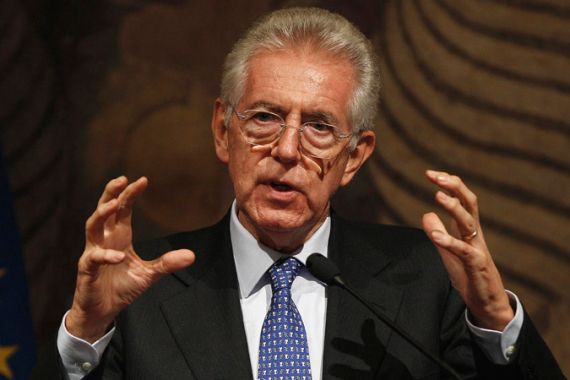Monti holding talks with Italy’s main parties
Political wrangling in Italy as Mario Monti tries to secure cross-party consensus for economic reforms.

Mario Monti, Italy’s new prime minister, is holding talks with leaders of Italy’s two largest parties as he continues to seek support for a government tasked with rescuing the country’s economy from a debt crisis.
The negotiations include members of former prime minister Silvio Berlusconi’s conservative PDL party and members of the center-left Democratic party. They will also address the issue of Monti’s cabinet, with both parties seeking representation in an administration expected to consist mostly of non-political appointees.
Keep reading
list of 4 itemsBoeing hit with 32 whistleblower claims, as dead worker’s case reviewed
US imposes new sanctions on Iran after attack on Israel
A flash flood and a quiet sale highlight India’s Sikkim’s hydro problems
|
“It will take years of unprecedentedly tight fiscal policy to get the public finances on a stable footing.” – Ben May, economist |
Monti, who hopes to resolve the issue before seeking a confidence vote on Friday, is seeking support to speed up delivery of economic reforms demanded by other eurozone nations and Europe’s central bank to prevent Italy from sliding into the sort of debt crisis that has crippled Greece.
Some conservatives, however, are looking to extract concessions in exchange for parliamentary support.
In an indication of a deep split in conservative ranks, one of its most prominent leaders, Franco Frattini, Italy’s foreign minister under Berlusconi, used a state TV interview to urge his party to rally behind Monti “with conviction and force” because “we can’t run the risk that this government won’t succeed”.
Monti’s supporters have argued that such political wrangling risks slowing the process of forming an administration and putting Italy’s economy at risk from fading investor confidence which threatens to force the cost of government borrowing to unsustainable levels.
Borrowing costs rise
Despite the speed with which Monti is moving ahead, investors remain nervous, and Italy’s borrowing costs rose Tuesday, with the yield on 10-year bonds creeping back up to 7.039 per cent, above the seven per cent level considered unsustainable in the long term by economists.
European stock markets were also rattled: Shares in Italy dropped more than two per cent, Frankfurt’s index shed more than one per cent, and stocks in Paris and London dipped as well.
Improving market confidence in Italy is crucial to the future of the eurozone, as the single currency bloc’s third largest economy is considered too expensive for the sort of rescue packages that have pulled Greece, Portugal and Ireland back from the brink of bankruptcy.
A default on its $2.6trn debt would trigger chaos in financial markets and shake the global economy.
The pressure for Italy to reform its economy is huge as it has become clear that the European Central Bank (ECB) is not shielding it from the bond market turmoil. The ECB is reluctant to protect governments from the market pressure, saying it is up to governments to convince investors of their economies’ worth.
That pressure helped accelerate a power shift in Rome, as it did in Greece, where Lucas Papademos, a former central bank chief, was appointed as head of a unity government last week.
The expectation from international creditors is that administrations of experts not affiliated to parties will be more willing to make unpopular decisions on even tougher austerity measures, even though several rounds of cuts in Greece have already provoked public resentment, protests and strikes.
But the fact that it will take time to shape up the battered economies of Italy and Greece kept investors on edge.
Analysts say Silvio Berlusconi‘s exit from the prime minister’s office – although he still serves in parliament – and Monti’s new government will only be the start of a long process of change in Italy.
“It will take years of unprecedentedly tight fiscal policy to get the public finances on a stable footing,” said Ben May, economist at Capital Economics.